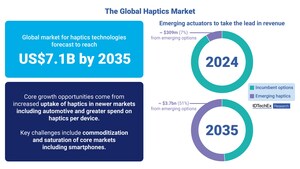BOSTON, Oct. 5, 2021 /PRNewswire/ -- In medicine, as well as in the healthcare and medical device industries, different conditions, specialisms, products, and companies alike are often organized around specific therapeutic areas. Whilst this is an excellent and efficient way to enable adequate specialization, there are also cases where a more general approach to patient monitoring is required. For a startup or other technology player with ambitions to create a new healthcare or wellness device, decisions need to be made early in the process about which route to take. Addressing specific issues within a particular therapeutic area can be extremely valuable, but also can come with technical and regulatory challenges, higher risk, and a smaller population of patients in the end. Taking a more general approach, perhaps with a twist on a monitoring technique that is more mature, can have a much larger population of potential users, but may have less technology differentiation and much more competition.
Examples of a comparison between these two approaches are covered in IDTechEx's report on Electronic Skin Patches. It contains dedicated chapters on diabetes management, cardiovascular diseases, wound care, and other specific therapeutic areas in which markets for skin patches as medical devices have developed. Historically, competitive device ecosystems have been separated along these lines, aligning with different medical specialisms and subsequent regulatory requirements and reimbursement categories; whilst there may be some common components and features across the wider ecosystem, patient needs differ based on the underlying condition and the product landscape reflects this.
Alongside these chapters by therapeutic area, the report also has chapters on "general" patient monitoring, separated further into examples of different types of inpatient and outpatient monitoring, with examples on both sides of the line between wellness and healthcare. These products are used to monitor the general health of the patient, including various combinations of vital signs (heart rate, respiration rate, body temperature, blood pressure) and/or other common metrics. When IDTechEx first published a report on the market for electronic skin patches over 5 years ago, these were relatively limited chapters, populated by groups of smaller companies doing excellent work at a limited scale to prove efficacy for these systems. By 2021, this section has expanded significantly, including some of the most exciting and disruptive news from the last year, prominent acquisitions, many product launches, and significant commercial momentum.
There are two key trends that are driving this shift towards more general patient monitoring solutions, as follows:
1. Value-based care
This involves the shift from fee-for-service (or "volume-based care") models to a results-based approach emphasizing quality of service and patient experience. General vital signs monitors can struggle to be effective in fee-for-service only models, as anomalies may only be detected in a small number of patients, so they can seem less effective when assessed as a one-off procedure. Here, their value may only emerge at times of acute medical needs, such as for hospital inpatients where the condition requires it, or during other periodic (but infrequent) general health checks.
Value-based care takes a broader view of the overall healthcare service provision, aiming to provide the best service for the entire population and lifetime rather than just focusing on the procedure. As such, if costs of cautionary or preventative measures can be shown to offset future costs associated with acute management once diseases progress, then they can be increasingly favored by the healthcare provider. This general change in approach has been widely discussed over the past decade. Changes have been subtle at first, starting with rhetoric from companies and maneuvering behind the scenes, but this fundamental change in approach can potentially have a significant impact on the healthcare and medical devices value chain for decades to come.
2. Remote patient monitoring
The second trend is what links the trends of value-based care and general vital sign monitoring to specific product types. In moving to remote monitoring of patients (i.e., detecting vital signs and other parameters as they go about their daily life rather than only testing whilst they are physically present at a medical facility), portable, digital, wireless devices are clearly favored. For general monitoring, these devices need to be cheap, comfortable, easy to use, and durable. Skin patches are a particularly popular form factor because consistent skin contact is well suited for measuring metrics such as biopotential, skin temperature, motion, and other metrics.
Remote monitoring of physiological metrics is not new in the medical device world. Areas such as diabetes management and cardiovascular disease monitoring (both covered at length in the IDTechEx report on Skin Patches) have been using wireless skin patches to collect patient data remotely for well over a decade. Other products such as connected blood pressure cuffs, scales, and other devices have also been adopted, and are covered in IDTechEx's report on Remote Patient Monitoring. However, general patient monitoring devices typically go wider than a single metric or disease vertical, with the potential to move to a more holistic approach to preventative monitoring.
These two trends together are driving growth in the market for general patient monitoring devices. With examples mentioned throughout IDTechEx's dedicated reports on Electronic Skin Patches, Remote Patient Monitoring and the rest of the portfolio of wearable technology and healthcare reports, IDTechEx analysts have followed this space from early medical and commercial trials through to adoption by some of the largest medical device players in the world (such as Philips, Boston Scientific, Baxter, and others). The latest report, "Electronic Skin Patches 2021-2031", predicts that the market for skin patches as a whole will grow at 15% CAGR from 2021-2031, but specific sectors such as wireless inpatient monitoring will grow by as much as 36% CAGR.
For more information on this report, please visit www.IDTechEx.com/Patches, or for the full portfolio of wearable and healthcare research available from IDTechEx please visit www.IDTechEx.com/Research/WT and www.IDTechEx.com/Research/Healthcare.
About IDTechEx
IDTechEx guides your strategic business decisions through its Research, Subscription and Consultancy products, helping you profit from emerging technologies. For more information, contact [email protected] or visit www.IDTechEx.com.
Media Contact:
Natalie Moreton
Digital Marketing Manager
[email protected]
+44(0)1223 812300
Social Media Links:
Twitter: https://www.twitter.com/IDTechEx
LinkedIn: https://www.linkedin.com/company/idtechex/
Facebook: https://www.facebook.com/IDTechExResearch
SOURCE IDTechEx

WANT YOUR COMPANY'S NEWS FEATURED ON PRNEWSWIRE.COM?
Newsrooms &
Influencers
Digital Media
Outlets
Journalists
Opted In






Share this article